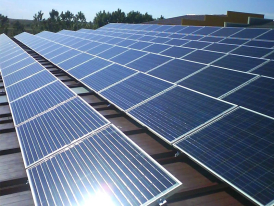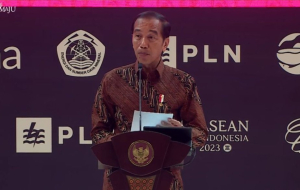Activists questions government’s renewable energy commitment
The Civil Society Coalition for Clean Energy questions the Indonesian government's serious commitment to transitioning to renewable energy following the government’s plan to revise the renewable energy target down to 17-19 percent by 2025 as stated in the revised draft of the National Energy Policy (KEN). Earlier the government’s target was set at 23 percent.
Deon Arinaldo, Energy Transformation Program Manager at the Institute of Essential Services Reform (IESR), said that instead of lowering the renewable energy (RE) target, the government should evaluate the factors causing the failure to achieve the renewable energy investment target so far.
"Because, even though it is still in the draft of government regulation of KEN, indications of lowering the target can have a negative impact on investor confidence in renewable energy investment in Indonesia," Deon emphasised.
Arif Adiputro, Study Division Head at the Indonesian Parliamentary Centre (IPC), said the target revision contradicts the government’s 2060 carbon neutral and the 29-31 percent greenhouse gas emission reduction commitments. He explained that in order to achieve these two targets, Indonesia should increase the renewable energy mix target to 45 percent by 2030.
"Decreasing the renewable energy mix target hampers efforts to encourage the development of renewable energy. This can have a negative impact on Indonesia's energy transition efforts, which aim to reduce dependence on fossil energy and reduce greenhouse gas emissions," Arif said.
In addition to lowering the RE target, the KEN draft revision also insists on including a number of false and pseudo solutions in the energy transition strategy. The details include the use of palm-based biodiesel up to a 60 percent blend (B60), the installation of carbon capture technology (CCS/CCUS) in all fossil-based power plants, and the operation of 250 megawatt (MW) nuclear power plants.
Grita Anindarini, Deputy Director of the Indonesian Centre for Environmental Law, said that the revision of the government regulation on KEN should be used as an opportunity to ensure that the national energy mix target is in line with the safe climate target. Therefore, the revision should instead set strict targets to end dependence on fossil energy and prioritize the development of renewable energy.
"Including nuclear power plants carries a huge risk to the protection of human rights in the form of serious toxic risks, which is very difficult to recover from. This brings risks to the protection of the right to life and the right to health," said Grita.
Another risk faced by lowering the target is the reduced potential for green jobs. Verena Puspawardani, Director of the Koaksi Indonesia Programme, estimates that the prospect of renewable energy engineering jobs could reach 432,000 by 2030, if the government is consistent with the target of 23 percent by 2025 and increases to 31 percent by 2050. This employment potential is 10 times that of 2019 and exceeds the current labor force in the fossil energy sector.
"When this target is lowered, the prospect of creating green jobs from the renewable energy sector will also decline. Whereas the increased potential for green jobs will contribute to the achievement of Indonesia's target to obtain investment for the development of green industries, address future employment needs, and public support for renewable energy," said Verena.
Increase is a must
Deon added that based on Minister of Energy and Mineral Resources (ESDM) Arifin Tasrif's statement, the economic aspect is no longer an obstacle to the development of renewable energy. Because the price of renewable energy electricity, especially solar and wind along with the cost of integration into the electricity network, is recognised as being able to compete with power plants that are incentivized by the US$ 70/ton coal price.
"So, the problem is not in the economics of renewable energy but the process of development and procurement. This needs to be fixed quickly. (State Electricity Company) PT PLN has planned to build 20.9 gigawatts (GW) of renewable energy in the 2021-2030 National Electricity Supply Business Plan (RUPTL), but the realisation is still slow until now," Deon explained.
For this reason, he said, PLN needs to be encouraged to change the renewable energy procurement process to be more massive, regular, and transparent. In addition, the government also needs to support and open opportunities for the industrial, commercial and community sectors to contribute to developing renewable energy.
"The government has set a National Strategic Project (PSN) of 3.6 GW rooftop PTLS by 2025, but the regulation of rooftop PTLS, namely the Minister of Energy and Mineral Resources Regulation 26/2021 is still delayed in implementation. This obstacle must be resolved," said Deon.
According to Arif, the government needs to make policies that favor renewable energy such as providing fiscal and non-fiscal incentives. "The incentives can reduce the cost of developing renewable energy. In addition, the House of Representatives (DPR) and the Regional Representatives Council (DPD) need to criticize and submit a right of inquiry to the government regarding the revision of the renewable energy mix target which is not in line with the ratification commitment of the Paris Agreement Law," Arif said.
Tag
Already have an account? Sign In
-
Start reading
Freemium
-
Monthly Subscription
30% OFF$26.03
$37.19/MonthCancel anytime
This offer is open to all new subscribers!
Subscribe now -
Yearly Subscription
33% OFF$228.13
$340.5/YearCancel anytime
This offer is open to all new subscribers!
Subscribe now






